401080 Research Protocol Design: Alzheimer's Healthcare in Australia
VerifiedAdded on 2022/10/11
|6
|1434
|9
Homework Assignment
AI Summary
This assignment, a research protocol for the course 401080, examines the growing problem of Alzheimer's disease in Australia. It begins by outlining the research problem, which is the lack of convincing research proving the effectiveness of brain training in improving cognitive abilities, despite the disease's increasing prevalence. The assignment then provides background information on Alzheimer's, including its impact, causes, and prevalence, highlighting that women are disproportionately affected. It identifies a gap in knowledge concerning the healthcare services available to older Australians with Alzheimer's and poses the research question: 'Are the older Australians slipping through the gaps of health care?' The aim of the research is to determine if older Australians receive adequate healthcare services, with expected benefits including answers about ongoing research progress and the adequacy of current healthcare services. The assignment includes references to relevant sources and concludes with a call for more judicious handling of the growing number of Alzheimer’s cases and related deaths.
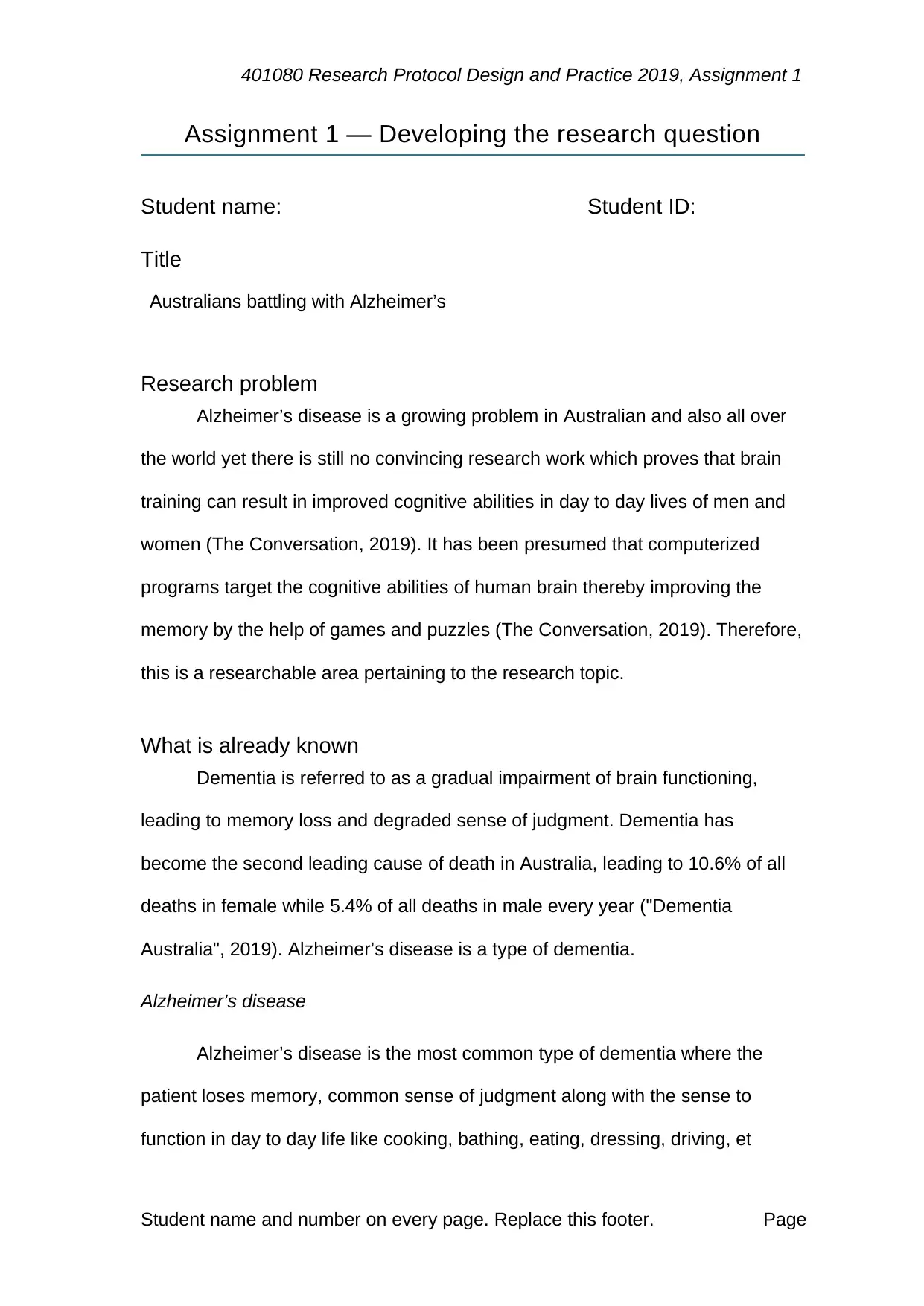
401080 Research Protocol Design and Practice 2019, Assignment 1
Assignment 1 — Developing the research question
Student name: Student ID:
Title
Australians battling with Alzheimer’s
Research problem
Alzheimer’s disease is a growing problem in Australian and also all over
the world yet there is still no convincing research work which proves that brain
training can result in improved cognitive abilities in day to day lives of men and
women (The Conversation, 2019). It has been presumed that computerized
programs target the cognitive abilities of human brain thereby improving the
memory by the help of games and puzzles (The Conversation, 2019). Therefore,
this is a researchable area pertaining to the research topic.
What is already known
Dementia is referred to as a gradual impairment of brain functioning,
leading to memory loss and degraded sense of judgment. Dementia has
become the second leading cause of death in Australia, leading to 10.6% of all
deaths in female while 5.4% of all deaths in male every year ("Dementia
Australia", 2019). Alzheimer’s disease is a type of dementia.
Alzheimer’s disease
Alzheimer’s disease is the most common type of dementia where the
patient loses memory, common sense of judgment along with the sense to
function in day to day life like cooking, bathing, eating, dressing, driving, et
Student name and number on every page. Replace this footer. Page
Assignment 1 — Developing the research question
Student name: Student ID:
Title
Australians battling with Alzheimer’s
Research problem
Alzheimer’s disease is a growing problem in Australian and also all over
the world yet there is still no convincing research work which proves that brain
training can result in improved cognitive abilities in day to day lives of men and
women (The Conversation, 2019). It has been presumed that computerized
programs target the cognitive abilities of human brain thereby improving the
memory by the help of games and puzzles (The Conversation, 2019). Therefore,
this is a researchable area pertaining to the research topic.
What is already known
Dementia is referred to as a gradual impairment of brain functioning,
leading to memory loss and degraded sense of judgment. Dementia has
become the second leading cause of death in Australia, leading to 10.6% of all
deaths in female while 5.4% of all deaths in male every year ("Dementia
Australia", 2019). Alzheimer’s disease is a type of dementia.
Alzheimer’s disease
Alzheimer’s disease is the most common type of dementia where the
patient loses memory, common sense of judgment along with the sense to
function in day to day life like cooking, bathing, eating, dressing, driving, et
Student name and number on every page. Replace this footer. Page
Paraphrase This Document
Need a fresh take? Get an instant paraphrase of this document with our AI Paraphraser
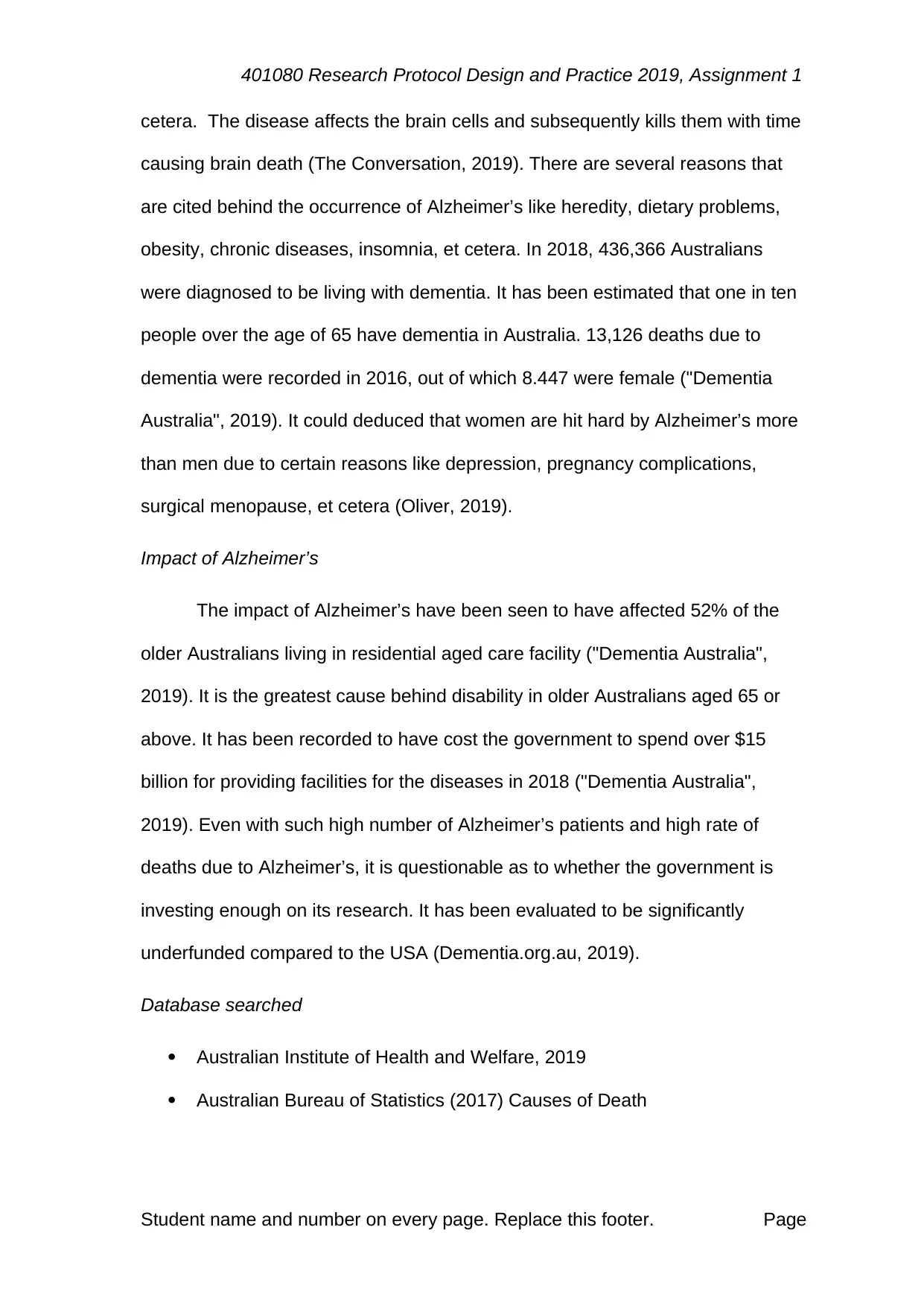
401080 Research Protocol Design and Practice 2019, Assignment 1
cetera. The disease affects the brain cells and subsequently kills them with time
causing brain death (The Conversation, 2019). There are several reasons that
are cited behind the occurrence of Alzheimer’s like heredity, dietary problems,
obesity, chronic diseases, insomnia, et cetera. In 2018, 436,366 Australians
were diagnosed to be living with dementia. It has been estimated that one in ten
people over the age of 65 have dementia in Australia. 13,126 deaths due to
dementia were recorded in 2016, out of which 8.447 were female ("Dementia
Australia", 2019). It could deduced that women are hit hard by Alzheimer’s more
than men due to certain reasons like depression, pregnancy complications,
surgical menopause, et cetera (Oliver, 2019).
Impact of Alzheimer’s
The impact of Alzheimer’s have been seen to have affected 52% of the
older Australians living in residential aged care facility ("Dementia Australia",
2019). It is the greatest cause behind disability in older Australians aged 65 or
above. It has been recorded to have cost the government to spend over $15
billion for providing facilities for the diseases in 2018 ("Dementia Australia",
2019). Even with such high number of Alzheimer’s patients and high rate of
deaths due to Alzheimer’s, it is questionable as to whether the government is
investing enough on its research. It has been evaluated to be significantly
underfunded compared to the USA (Dementia.org.au, 2019).
Database searched
Australian Institute of Health and Welfare, 2019
Australian Bureau of Statistics (2017) Causes of Death
Student name and number on every page. Replace this footer. Page
cetera. The disease affects the brain cells and subsequently kills them with time
causing brain death (The Conversation, 2019). There are several reasons that
are cited behind the occurrence of Alzheimer’s like heredity, dietary problems,
obesity, chronic diseases, insomnia, et cetera. In 2018, 436,366 Australians
were diagnosed to be living with dementia. It has been estimated that one in ten
people over the age of 65 have dementia in Australia. 13,126 deaths due to
dementia were recorded in 2016, out of which 8.447 were female ("Dementia
Australia", 2019). It could deduced that women are hit hard by Alzheimer’s more
than men due to certain reasons like depression, pregnancy complications,
surgical menopause, et cetera (Oliver, 2019).
Impact of Alzheimer’s
The impact of Alzheimer’s have been seen to have affected 52% of the
older Australians living in residential aged care facility ("Dementia Australia",
2019). It is the greatest cause behind disability in older Australians aged 65 or
above. It has been recorded to have cost the government to spend over $15
billion for providing facilities for the diseases in 2018 ("Dementia Australia",
2019). Even with such high number of Alzheimer’s patients and high rate of
deaths due to Alzheimer’s, it is questionable as to whether the government is
investing enough on its research. It has been evaluated to be significantly
underfunded compared to the USA (Dementia.org.au, 2019).
Database searched
Australian Institute of Health and Welfare, 2019
Australian Bureau of Statistics (2017) Causes of Death
Student name and number on every page. Replace this footer. Page
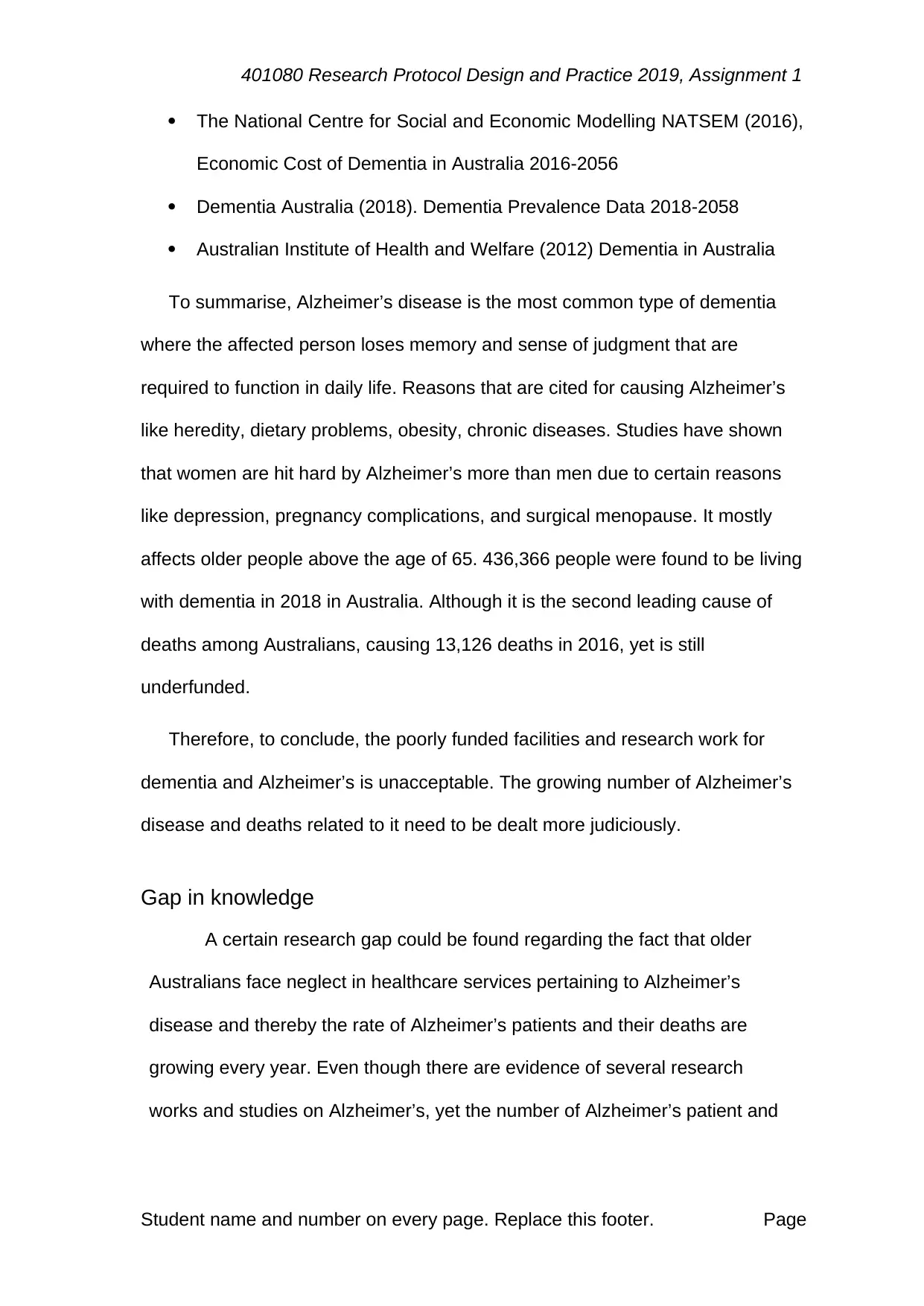
401080 Research Protocol Design and Practice 2019, Assignment 1
The National Centre for Social and Economic Modelling NATSEM (2016),
Economic Cost of Dementia in Australia 2016-2056
Dementia Australia (2018). Dementia Prevalence Data 2018-2058
Australian Institute of Health and Welfare (2012) Dementia in Australia
To summarise, Alzheimer’s disease is the most common type of dementia
where the affected person loses memory and sense of judgment that are
required to function in daily life. Reasons that are cited for causing Alzheimer’s
like heredity, dietary problems, obesity, chronic diseases. Studies have shown
that women are hit hard by Alzheimer’s more than men due to certain reasons
like depression, pregnancy complications, and surgical menopause. It mostly
affects older people above the age of 65. 436,366 people were found to be living
with dementia in 2018 in Australia. Although it is the second leading cause of
deaths among Australians, causing 13,126 deaths in 2016, yet is still
underfunded.
Therefore, to conclude, the poorly funded facilities and research work for
dementia and Alzheimer’s is unacceptable. The growing number of Alzheimer’s
disease and deaths related to it need to be dealt more judiciously.
Gap in knowledge
A certain research gap could be found regarding the fact that older
Australians face neglect in healthcare services pertaining to Alzheimer’s
disease and thereby the rate of Alzheimer’s patients and their deaths are
growing every year. Even though there are evidence of several research
works and studies on Alzheimer’s, yet the number of Alzheimer’s patient and
Student name and number on every page. Replace this footer. Page
The National Centre for Social and Economic Modelling NATSEM (2016),
Economic Cost of Dementia in Australia 2016-2056
Dementia Australia (2018). Dementia Prevalence Data 2018-2058
Australian Institute of Health and Welfare (2012) Dementia in Australia
To summarise, Alzheimer’s disease is the most common type of dementia
where the affected person loses memory and sense of judgment that are
required to function in daily life. Reasons that are cited for causing Alzheimer’s
like heredity, dietary problems, obesity, chronic diseases. Studies have shown
that women are hit hard by Alzheimer’s more than men due to certain reasons
like depression, pregnancy complications, and surgical menopause. It mostly
affects older people above the age of 65. 436,366 people were found to be living
with dementia in 2018 in Australia. Although it is the second leading cause of
deaths among Australians, causing 13,126 deaths in 2016, yet is still
underfunded.
Therefore, to conclude, the poorly funded facilities and research work for
dementia and Alzheimer’s is unacceptable. The growing number of Alzheimer’s
disease and deaths related to it need to be dealt more judiciously.
Gap in knowledge
A certain research gap could be found regarding the fact that older
Australians face neglect in healthcare services pertaining to Alzheimer’s
disease and thereby the rate of Alzheimer’s patients and their deaths are
growing every year. Even though there are evidence of several research
works and studies on Alzheimer’s, yet the number of Alzheimer’s patient and
Student name and number on every page. Replace this footer. Page
⊘ This is a preview!⊘
Do you want full access?
Subscribe today to unlock all pages.

Trusted by 1+ million students worldwide
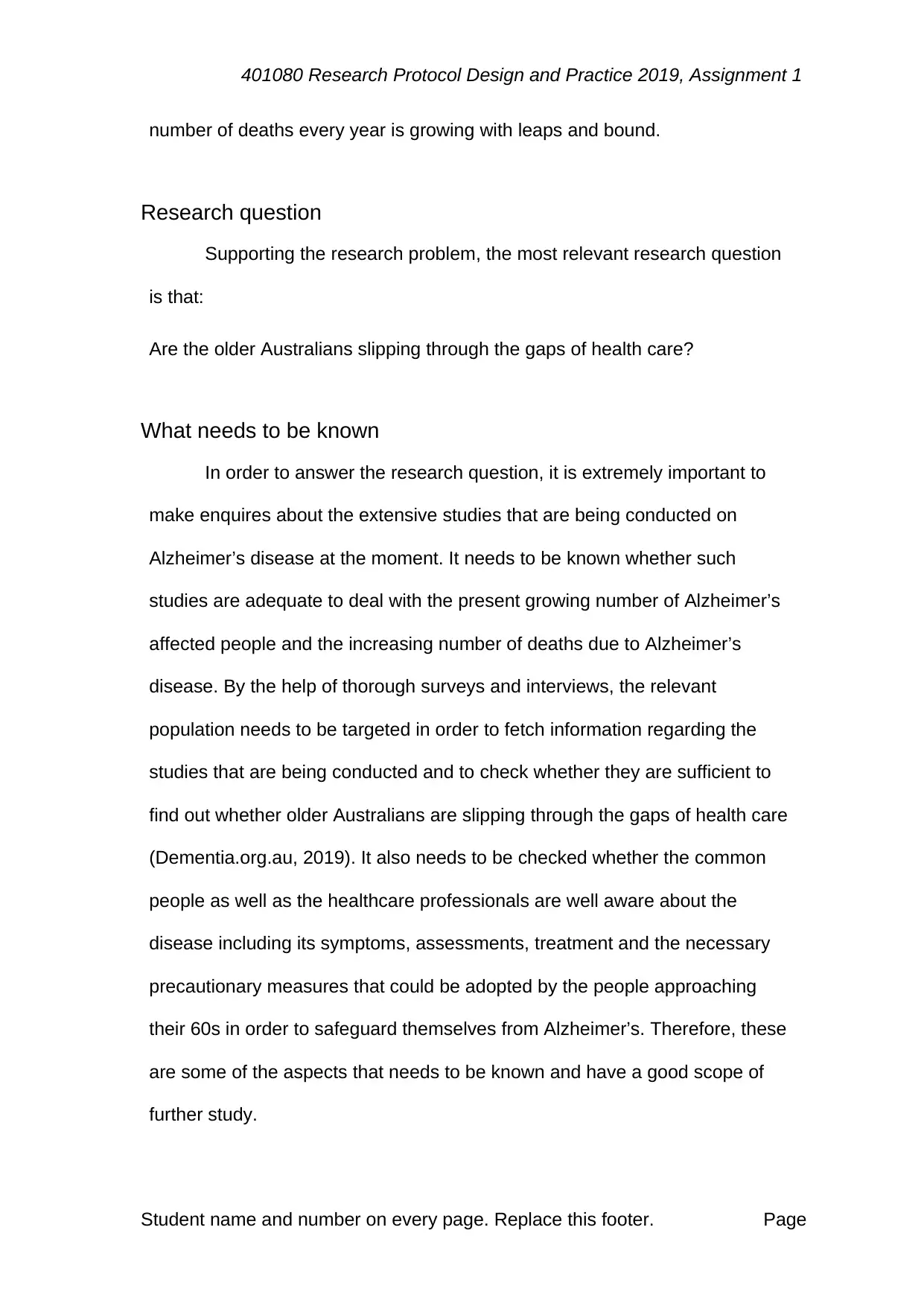
401080 Research Protocol Design and Practice 2019, Assignment 1
number of deaths every year is growing with leaps and bound.
Research question
Supporting the research problem, the most relevant research question
is that:
Are the older Australians slipping through the gaps of health care?
What needs to be known
In order to answer the research question, it is extremely important to
make enquires about the extensive studies that are being conducted on
Alzheimer’s disease at the moment. It needs to be known whether such
studies are adequate to deal with the present growing number of Alzheimer’s
affected people and the increasing number of deaths due to Alzheimer’s
disease. By the help of thorough surveys and interviews, the relevant
population needs to be targeted in order to fetch information regarding the
studies that are being conducted and to check whether they are sufficient to
find out whether older Australians are slipping through the gaps of health care
(Dementia.org.au, 2019). It also needs to be checked whether the common
people as well as the healthcare professionals are well aware about the
disease including its symptoms, assessments, treatment and the necessary
precautionary measures that could be adopted by the people approaching
their 60s in order to safeguard themselves from Alzheimer’s. Therefore, these
are some of the aspects that needs to be known and have a good scope of
further study.
Student name and number on every page. Replace this footer. Page
number of deaths every year is growing with leaps and bound.
Research question
Supporting the research problem, the most relevant research question
is that:
Are the older Australians slipping through the gaps of health care?
What needs to be known
In order to answer the research question, it is extremely important to
make enquires about the extensive studies that are being conducted on
Alzheimer’s disease at the moment. It needs to be known whether such
studies are adequate to deal with the present growing number of Alzheimer’s
affected people and the increasing number of deaths due to Alzheimer’s
disease. By the help of thorough surveys and interviews, the relevant
population needs to be targeted in order to fetch information regarding the
studies that are being conducted and to check whether they are sufficient to
find out whether older Australians are slipping through the gaps of health care
(Dementia.org.au, 2019). It also needs to be checked whether the common
people as well as the healthcare professionals are well aware about the
disease including its symptoms, assessments, treatment and the necessary
precautionary measures that could be adopted by the people approaching
their 60s in order to safeguard themselves from Alzheimer’s. Therefore, these
are some of the aspects that needs to be known and have a good scope of
further study.
Student name and number on every page. Replace this footer. Page
Paraphrase This Document
Need a fresh take? Get an instant paraphrase of this document with our AI Paraphraser
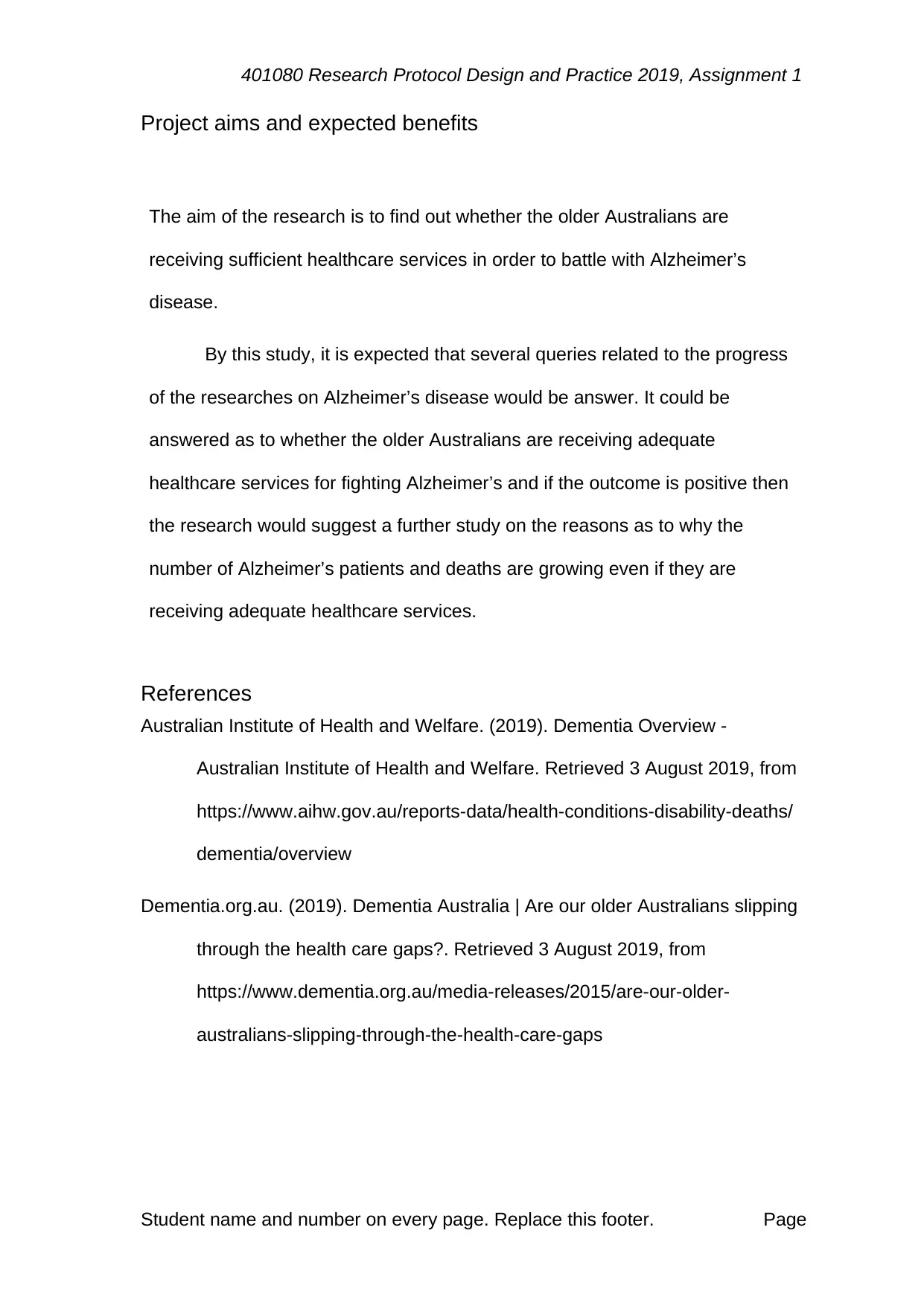
401080 Research Protocol Design and Practice 2019, Assignment 1
Project aims and expected benefits
The aim of the research is to find out whether the older Australians are
receiving sufficient healthcare services in order to battle with Alzheimer’s
disease.
By this study, it is expected that several queries related to the progress
of the researches on Alzheimer’s disease would be answer. It could be
answered as to whether the older Australians are receiving adequate
healthcare services for fighting Alzheimer’s and if the outcome is positive then
the research would suggest a further study on the reasons as to why the
number of Alzheimer’s patients and deaths are growing even if they are
receiving adequate healthcare services.
References
Australian Institute of Health and Welfare. (2019). Dementia Overview -
Australian Institute of Health and Welfare. Retrieved 3 August 2019, from
https://www.aihw.gov.au/reports-data/health-conditions-disability-deaths/
dementia/overview
Dementia.org.au. (2019). Dementia Australia | Are our older Australians slipping
through the health care gaps?. Retrieved 3 August 2019, from
https://www.dementia.org.au/media-releases/2015/are-our-older-
australians-slipping-through-the-health-care-gaps
Student name and number on every page. Replace this footer. Page
Project aims and expected benefits
The aim of the research is to find out whether the older Australians are
receiving sufficient healthcare services in order to battle with Alzheimer’s
disease.
By this study, it is expected that several queries related to the progress
of the researches on Alzheimer’s disease would be answer. It could be
answered as to whether the older Australians are receiving adequate
healthcare services for fighting Alzheimer’s and if the outcome is positive then
the research would suggest a further study on the reasons as to why the
number of Alzheimer’s patients and deaths are growing even if they are
receiving adequate healthcare services.
References
Australian Institute of Health and Welfare. (2019). Dementia Overview -
Australian Institute of Health and Welfare. Retrieved 3 August 2019, from
https://www.aihw.gov.au/reports-data/health-conditions-disability-deaths/
dementia/overview
Dementia.org.au. (2019). Dementia Australia | Are our older Australians slipping
through the health care gaps?. Retrieved 3 August 2019, from
https://www.dementia.org.au/media-releases/2015/are-our-older-
australians-slipping-through-the-health-care-gaps
Student name and number on every page. Replace this footer. Page
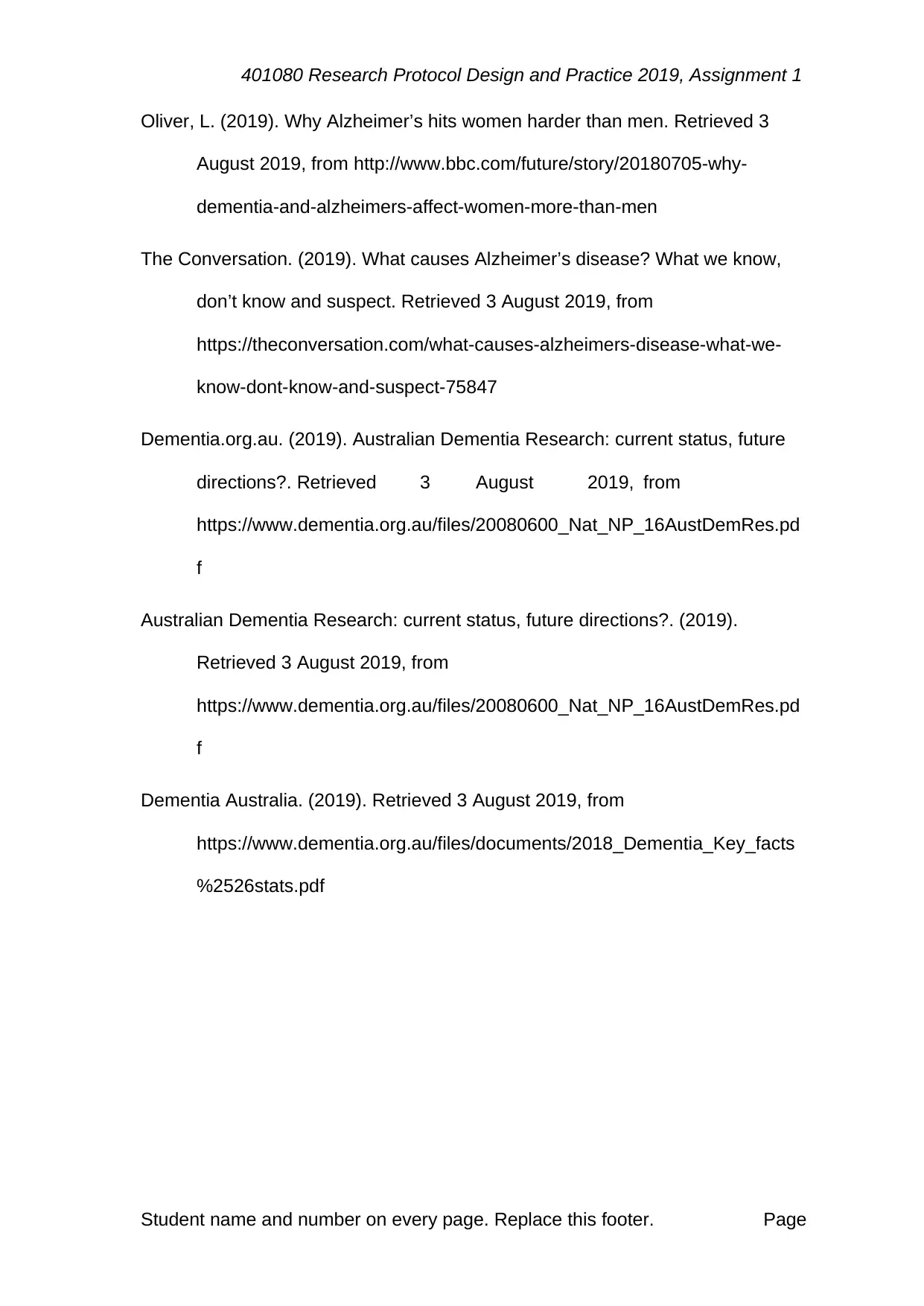
401080 Research Protocol Design and Practice 2019, Assignment 1
Oliver, L. (2019). Why Alzheimer’s hits women harder than men. Retrieved 3
August 2019, from http://www.bbc.com/future/story/20180705-why-
dementia-and-alzheimers-affect-women-more-than-men
The Conversation. (2019). What causes Alzheimer’s disease? What we know,
don’t know and suspect. Retrieved 3 August 2019, from
https://theconversation.com/what-causes-alzheimers-disease-what-we-
know-dont-know-and-suspect-75847
Dementia.org.au. (2019). Australian Dementia Research: current status, future
directions?. Retrieved 3 August 2019, from
https://www.dementia.org.au/files/20080600_Nat_NP_16AustDemRes.pd
f
Australian Dementia Research: current status, future directions?. (2019).
Retrieved 3 August 2019, from
https://www.dementia.org.au/files/20080600_Nat_NP_16AustDemRes.pd
f
Dementia Australia. (2019). Retrieved 3 August 2019, from
https://www.dementia.org.au/files/documents/2018_Dementia_Key_facts
%2526stats.pdf
Student name and number on every page. Replace this footer. Page
Oliver, L. (2019). Why Alzheimer’s hits women harder than men. Retrieved 3
August 2019, from http://www.bbc.com/future/story/20180705-why-
dementia-and-alzheimers-affect-women-more-than-men
The Conversation. (2019). What causes Alzheimer’s disease? What we know,
don’t know and suspect. Retrieved 3 August 2019, from
https://theconversation.com/what-causes-alzheimers-disease-what-we-
know-dont-know-and-suspect-75847
Dementia.org.au. (2019). Australian Dementia Research: current status, future
directions?. Retrieved 3 August 2019, from
https://www.dementia.org.au/files/20080600_Nat_NP_16AustDemRes.pd
f
Australian Dementia Research: current status, future directions?. (2019).
Retrieved 3 August 2019, from
https://www.dementia.org.au/files/20080600_Nat_NP_16AustDemRes.pd
f
Dementia Australia. (2019). Retrieved 3 August 2019, from
https://www.dementia.org.au/files/documents/2018_Dementia_Key_facts
%2526stats.pdf
Student name and number on every page. Replace this footer. Page
⊘ This is a preview!⊘
Do you want full access?
Subscribe today to unlock all pages.

Trusted by 1+ million students worldwide
1 out of 6
Related Documents
Your All-in-One AI-Powered Toolkit for Academic Success.
+13062052269
info@desklib.com
Available 24*7 on WhatsApp / Email
![[object Object]](/_next/static/media/star-bottom.7253800d.svg)
Unlock your academic potential
Copyright © 2020–2026 A2Z Services. All Rights Reserved. Developed and managed by ZUCOL.





